Covid-19 infection rates have increased to 13% at Capitol's testing center, physician says
From CNN's Melanie Zanona, Ryan Nobles and Kristin Wilson
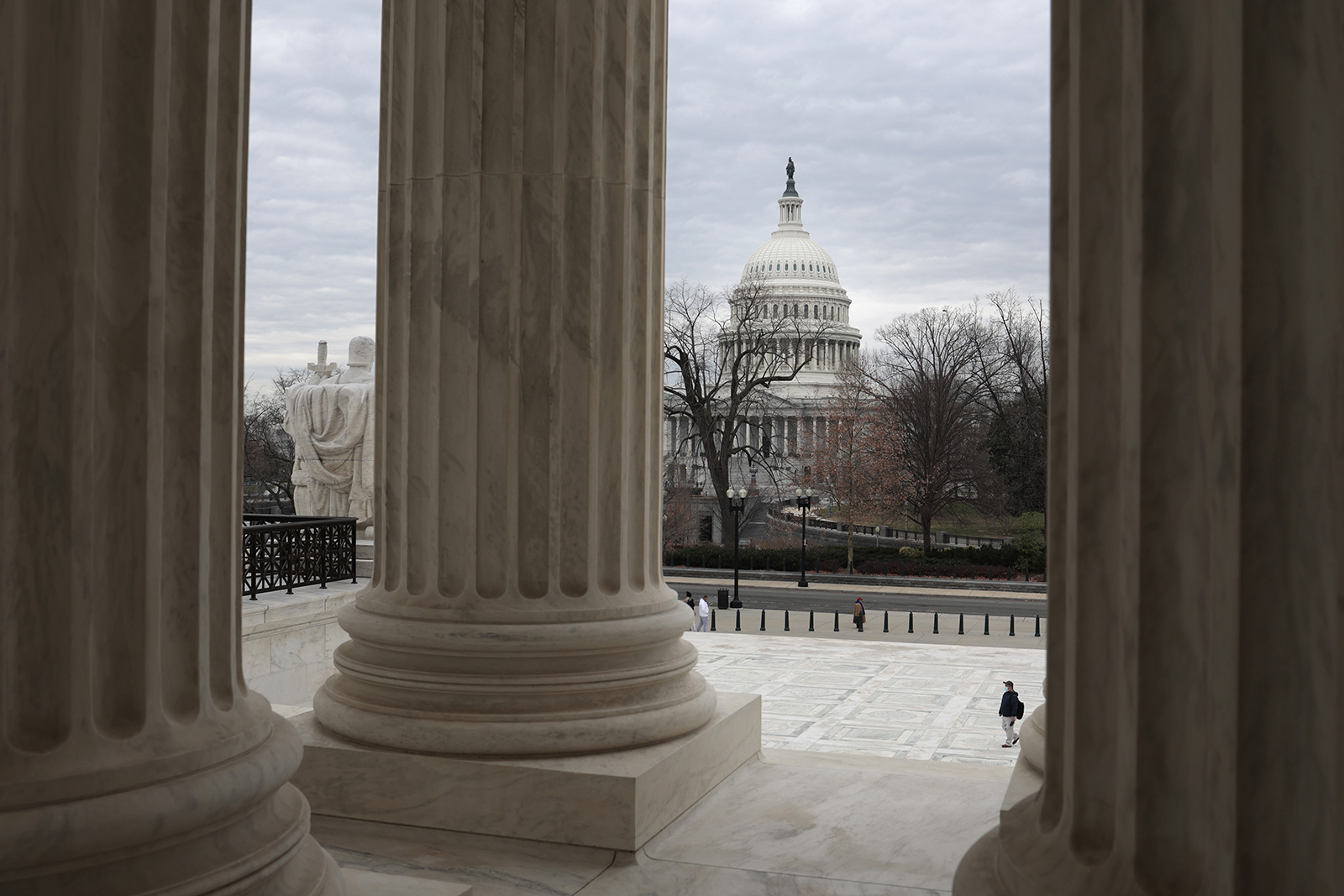
The number of positive coronavirus infection rates at the Capitol’s testing center have increased from 1% to 13%, according to a letter from the Office of the Attending Physician that was sent to congressional offices and obtained by CNN.
This comes as coronavirus cases have exploded in the DC area, which has the highest number of cases per population size in the country, according to the letter. Over a dozen lawmakers have announced breakthrough cases in recent weeks.
The Office of the Attending Physician (OAP) says most of the positive cases identified at the Capitol are breakthrough infections among vaccinated individuals and have not “led to hospitalizations, serious complications, or deaths, attesting to the value of coronavirus vaccinations.” So far, the OAP has administered booster vaccinations to more than 7,500 Capitol personnel.
“Most cases at the Capitol are breakthrough infections, with omicron virus variant representing approximately 61% and the delta virus variant 38% of our positive cases in a limited sampling as of December 15, 2021,” the letter states. “Dozens of individuals with coronavirus infection are identified at the Capitol daily, with the majority of these occurring in vaccinated individuals.”
The OAP advised offices to shift to a “maximal telework posture” and wear masks for any group activity indoors. The OAP also said “blue surgical masks, cloth face masks and gaiter masks must be replaced by the more protective KN95 or N95 masks.”
New York governor on state's current Covid-19 metrics: "We’re not in a good place"
From CNN's Kristina Sgueglia
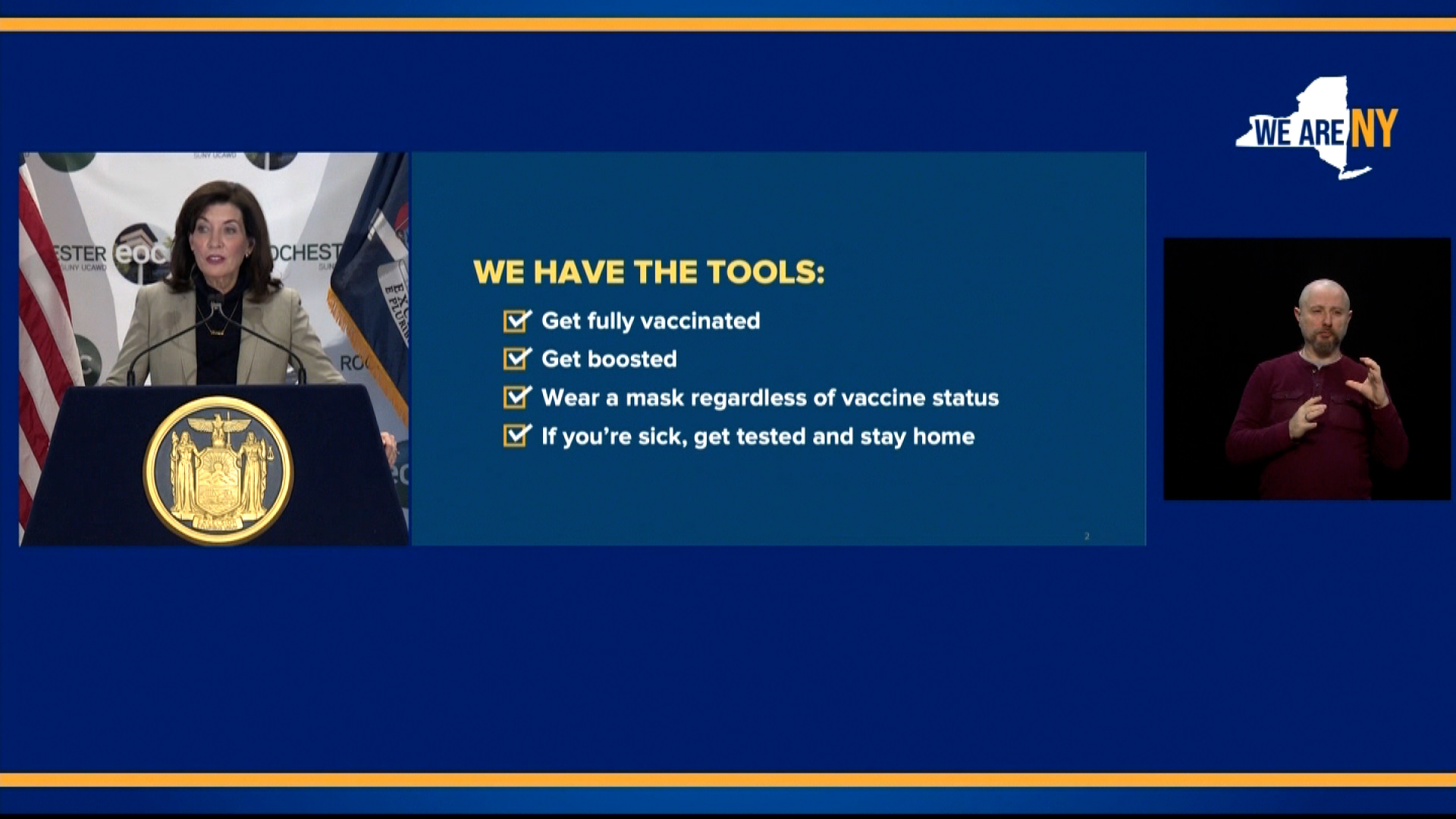
New York Gov. Kathy Hochul didn’t sugar coat it Monday when speaking about Covid-19 metrics, saying “We’re not in a good place, I’m going to be really honest with you.”
“This is the winter surge we predicted,” she said speaking at SUNY Rochester Educational Opportunity Center.
“We fully anticipate on top of the surge that has already been ongoing that there’s going to be another wave that's occurring as a result of these holidays,” she said.
“Our numbers are misleading today,” the governor continued, reporting approximately 51,000 positive cases.
“They didn’t go from nearly 90,000 to 51,000," she said, noting that the shift in latest case numbers is due to people not getting tested over the weekend.
“Unfortunately I’m going to say is a result of the holiday weekend. Those numbers are probably going to be much higher tomorrow," the governor added.
She said the numbers are “rather shocking,” and while people are testing positive at a much higher rate “the severity of the illness is far less than we’ve seen before.”
She recalled the first Omicron case was reported on Dec. 2 and said “literally a month later we have enough data to say right now — we can say with certainty — that the cases are not presenting themselves as severely as they could have or we had feared. That is a silver lining…”
The state is also reporting an increase in hospitalizations – up at least 9,563. Hochul said the trend in hospitalizations is shooting up, and she’d “love to see it come straight down.”
The governor said beginning Tuesday, her team is going to poll hospitals to see how many people are being hospitalized for Covid-19 symptoms vs how many people are being hospitalized for other issues and develop Covid-19, to give more transparency.
“Hospital capacity is still hospital capacity, you either have beds for sick people or you don’t,” she said.
Speaking from northern New York, she said specifically the Finger Lakes hospitals had 2.8% bed capacity and Monroe County 1.8% bed capacity. “That’s a low number,” she said, reminding that the federal government has sent resources to assist, including nat guard members who are training.
Right now there are 21 hospitals that have elective procedures paused, something that happens when they are at only 10% capacity left. This is down from 32, she said.
Meanwhile, New York has obtained 37 million at-home test kits and has begun distributing them, in part to Rochester to be distributed to schools.
Hochul said 103 people were reported to have died from Covid-19 related complications, and she mentioned by name a 17-year-old from the Rochester community.
She also said SUNY schools were going to open additional testing sites to the public beginning tomorrow.
Maryland state buildings will require masks and employees will get paid leave for booster shots
From CNN's Evan Simko-Bednarski
Maryland is mandating masks in all state-run facilities, according to an announcement Monday from Gov. Larry Hogan.
The effort is one of several announced Monday in the hope of slowing the state's Covid-19 surge.
The state reported a seven-day positivity rate of 27% on Sunday, with 2,746 residents hospitalized with Covid-19 — more than any other time since the start of the pandemic.
Hogan also announced that state employees will be eligible for two hours of paid leave to receive a Covid-19 booster shot.
The state reports administering over 1.6 million booster doses so far.
FDA leaders moved “as quickly as we possibly could” to expand boosters to 12 to 15 age group
From CNN’s Deidre McPhillips
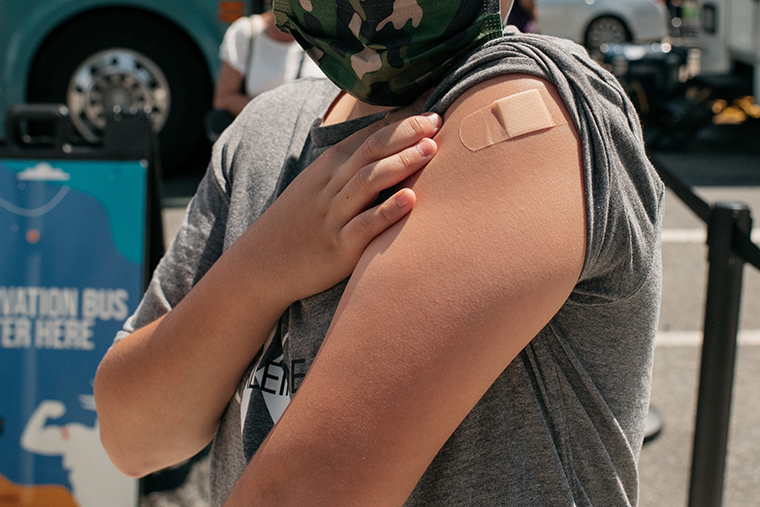
Leaders of the US Food and Drug Administration did not formally consult their advisory board before expanding booster eligibility to children ages 12 to 15 on Monday, as the rapid rise in cases across the country made it clear that the benefits of vaccination clearly outweighed the risks, Dr. Peter Marks, director of the FDA’s Center for Biologics Evaluation and Research, said Monday during a call with reporters.
The agency used real-world data from Israel, including safety data from 6,300 children ages 12 to 15 who received a booster dose. There were no new cases of myocarditis or pericarditis reported.
The FDA uses “discretion” when bringing questions to its advisory board, focusing on those that require public discussion, Marks said, and the current situation made the risk-benefit analysis clear.
“That’s not to say we don’t care about this and that – it’s not important. But what it is to say is that in the setting of a tremendous number of Omicron and Delta cases in this country, the potential benefits of getting vaccinated in this age range outweigh that risk,” Marks said. “It made sense to move as quickly as we possibly could.”
Marks said that data shows that the risk of myocarditis is lower with a booster dose than it is for the second dose among children ages 12 to 15, and cases have been generally mild with minimal long-lasting effects.
“The inference here is that the risk of myocarditis with third doses in the 12 to 15 year age range is likely to be quite acceptable given the potential benefits.”
FDA leaders reiterate that an Omicron-specific vaccine might not be necessary
From CNN's Deidre McPhillips
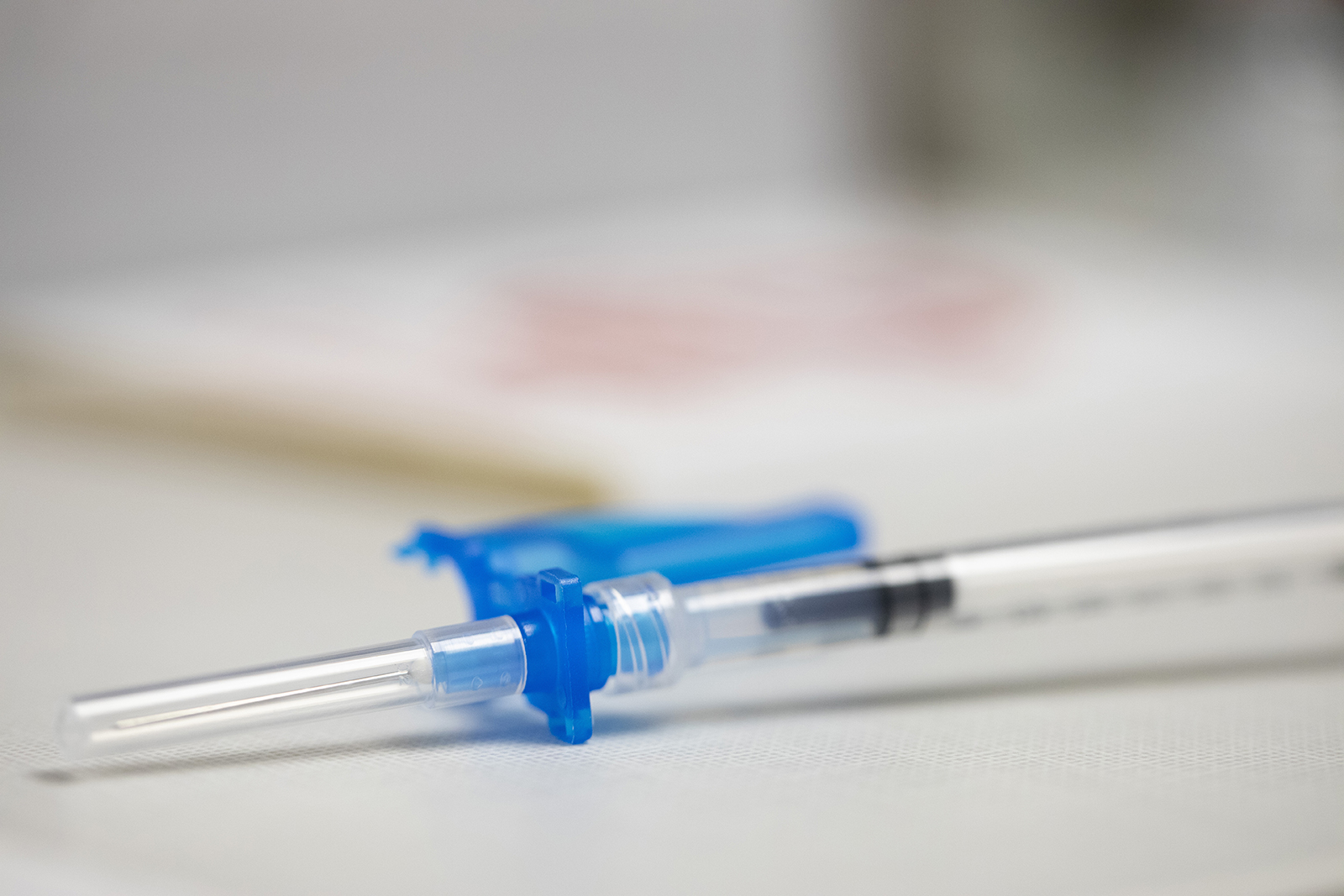
Vaccine manufacturers are all working toward the possibility of an Omicron-specific vaccine, but it might not be necessary, leaders of the US Food and Drug Administration said Monday.
“We don’t know yet whether Omicron will take hold as the dominant variant over time. It could be that we have a very quick wave of Omicron and something else will be left behind it. Until we understand that, we can’t say with certainty what we will do with a variant vaccine,” said Dr. Peter Marks, director of the FDA’s Center for Biologics Evaluation and Research. “In other words, we don’t know yet whether it will have to be deployed, but we’ll be ready in case it does need to be deployed.”
If a booster shot of the current vaccine appears to offer sufficient protection, there is less need for a variant-specific vaccine, said acting FDA Commissioner Dr. Janet Woodcock.
“The last thing we want to do is just be going through and getting new vaccines and this and that if the current boosters look like they will really do the job against Omicron,” she said. “Then, we also have to consider that we might have additional variants, but we will be ready to switch if needed.”
India vaccinates more than 4 million children on first day of Covid-19 vaccine rollout
From CNN's Swati Gupta in New Delhi
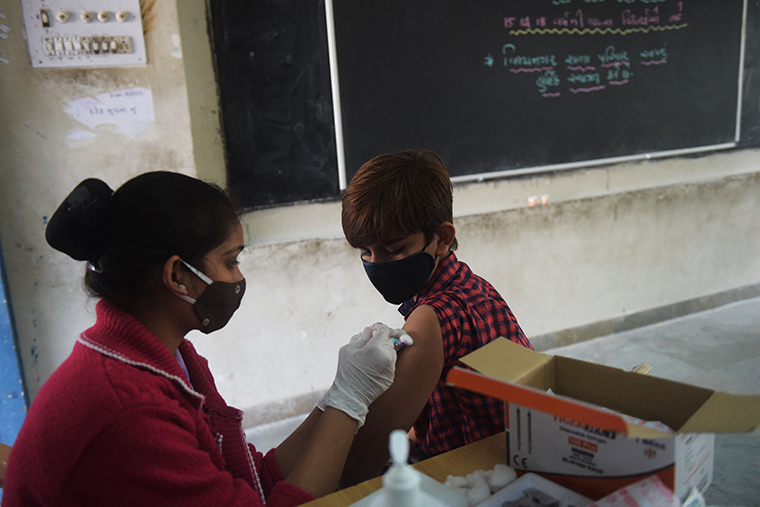
More than 4 million children between the ages of 15 and 18 were vaccinated on Monday after the Indian government approved Covid-19 vaccines for the age group last month.
“Well done Young India! Over 4 million between 15-18 age group received their first dose of Covid-19 vaccine on the 1st day of vaccination drive for children. This is another feather in the cap of India’s vaccination drive,” India’s Health Minister Mansukh Mandaviya tweeted Monday.
India’s Prime Minister Narendra Modi also took to Twitter on Monday in praise of vaccinations for children ages 15 to 18, “Today we have taken an important step forward in protecting our youth against COVID-19. Congrats to all my young friends between the age group of 15-18 who got vaccinated.Congrats to their parents as well. I would urge more youngsters to get vaccinated in the coming days!”
India has been slow at issuing approval of vaccines for children and overall with the rollout of booster shots. Last month, during a Christmas Day address, Modi announced the start of limited shots of vaccines for children and booster shots for certain citizens.
Booster shots will be available for people aged 60 and older with pre-existing medical conditions, healthcare personnel and frontline workers starting on Jan. 10.
The third wave of Covid-19 has caused a surge in the number of reported cases in India, with the Ministry of Health reporting 33,750 new Covid-19 cases on Monday morning.
At least 3,800 frontline workers out on Covid-related leave in Ireland as hospitalizations rise by 43%
From Niamh Kennedy in Dublin
At least 3,800 frontline workers in Ireland are currently away from work on Covid-related leave, according to one of the country's top health officials.
Speaking to RTÉ Radio 1's "This Week" program Sunday, Dr. Colm Henry, chief clinical officer for the Health Service Executive (HSE), explained those 3,800 workers either have Covid-19 themselves or have had a close contact and added he expects this number to go "much higher."
This comes as data revealed that Ireland recorded more Covid-19 cases during the Christmas period than all of 2020. An additional 16,986 cases were recorded on Monday by the health ministry.
It is understood that one in nine ICU staff in Ireland are currently off due to Covid-19.
One of the capital's key hospitals, the Mater Hospital, is already under "severe trouble" with one in ten intensive care unit staff out of work due to Covid-19, according to Henry.
The Dublin based hospital put out a statement on Saturday, urging members of the public "where possible, to avoid its emergency department."
"Hospital services are under extreme pressure due to a combination of large numbers of people contracting Covid, high numbers of presentations at the ED and high levels of staff absenteeism due to Covid-19," the statement continued.
This pressure has resulted in patients presenting themselves at ICUs with non-urgent conditions having to endure long waiting times, the statement added.
Anne O'Connor, the HSE's Chief Operations Officer, told RTÉ Radio 1 on Dec. 29 that the Irish health service is seeing "some of our sites challenged" with beds not being able to open due to "staffing challenges."
Hospitalizations in Ireland have risen by 43% over the course of the past week, according to health ministry data. There are currently 807 people in Irish hospitals with Covid-19.
Even before Omicron hit, the health service had instructed hospitals to "take whatever actions they needed to redeploy staff and to support essential service," Henry said.
The health service is also invoking a derogation policy which allows close contact healthcare workers to come to work under supervision provided they aren't presenting symptoms of the virus, Henry added.
The system will also "take advantage" of the reduction of the self-isolation period from 10 days to seven days for people who received the booster vaccine which came into effect Monday.
Here's a look at how schools across the US are adjusting their post-holiday reopening due to Omicron
From CNN's David Shortall
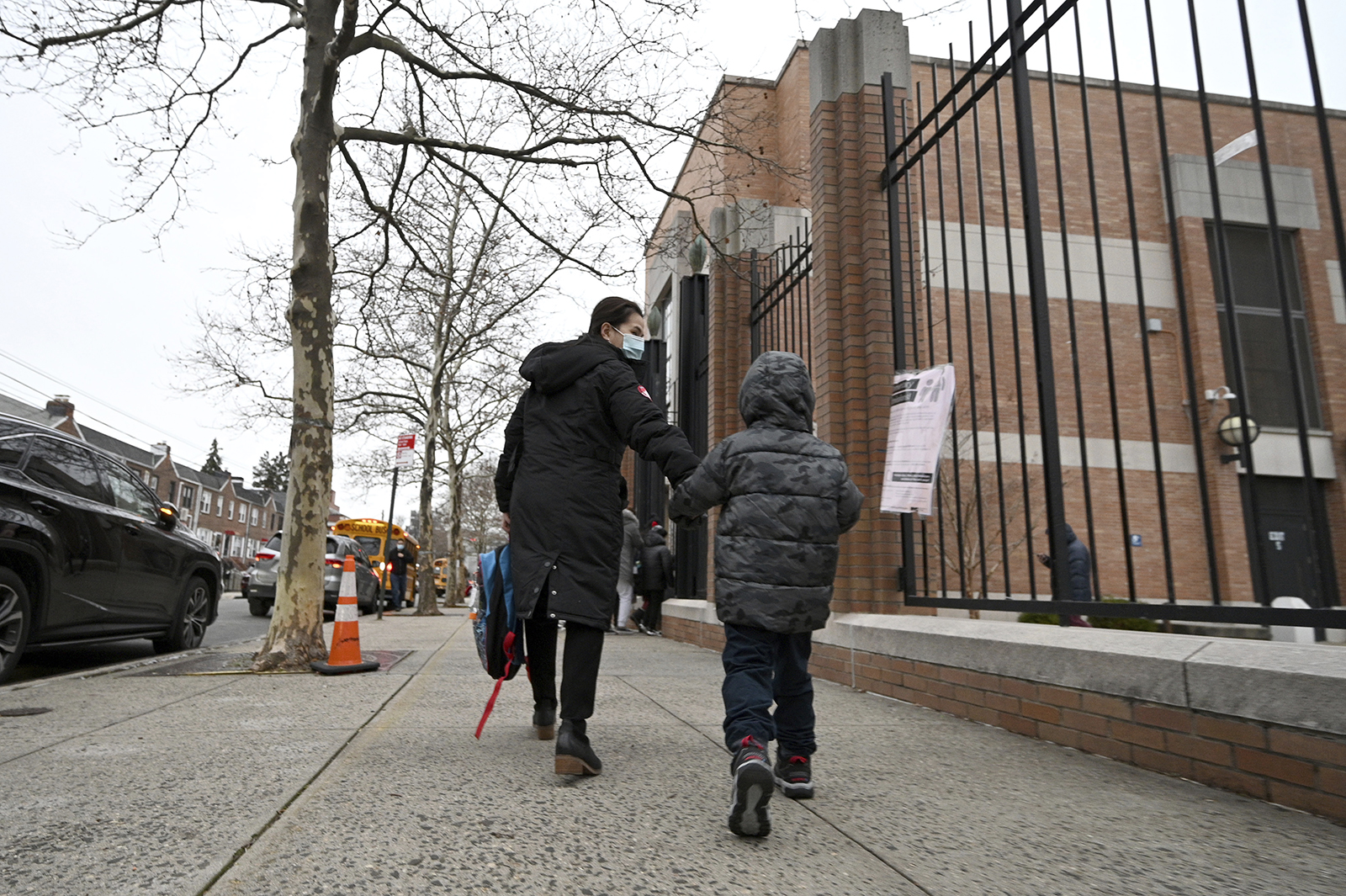
School districts across the US have diverged in their plans to return post-holidays this week as Omicron case numbers continue to surge.
While there is an intent across the board to have in-person learning, some districts have closed or shifted online in part due to staffing shortages. Others are delaying the return to allow for test pickup. Most are opening without incident.
More than 2,100 schools across the country have shifted to remote learning or delayed their return, according to data company Burbio, which aggregates closure information based on school calendars and other sources.
Here's a sampling of the varying responses across some of the larger districts:
Shifting to online:
- At least five metro Atlanta school districts will be remote Jan. 3-7
- Cleveland, Ohio, will be remote Jan. 3-7
- Newark, New Jersey, will be remote Jan. 3-14
- Paterson, New Jersey, will be remote Jan. 4-18
- Milwaukee, Wisconsin, will be remote Jan. 4-7
- Prince George’s County, Maryland, will be remote Jan. 3-18
Delaying return:
- Seattle is pushing their return back one day to Jan. 4 to allow for test pickup Jan. 3
- Washington, DC, is pushing their return back three days to Jan. 6 to allow for test pickup Jan. 4 and 5 (delayed one day by winter storm closure Jan .3) and a negative test will be required for students
- Syracuse, New York, is canceling school Jan. 3 due to “increasing number of positive COVID-19 cases being reported across the District and the lack of substitutes available to cover their absences.”
Opening as scheduled:
- New York City is among the cities opening as scheduled Monday, with surveillance doubled to include 20% of students and a new testing strategy that will return students with close contacts and no symptoms sooner after testing.
FDA authorizes Pfizer Covid-19 vaccine boosters for 12- to 15-year-olds
From CNN's Deidre McPhillips and Ben Tinker
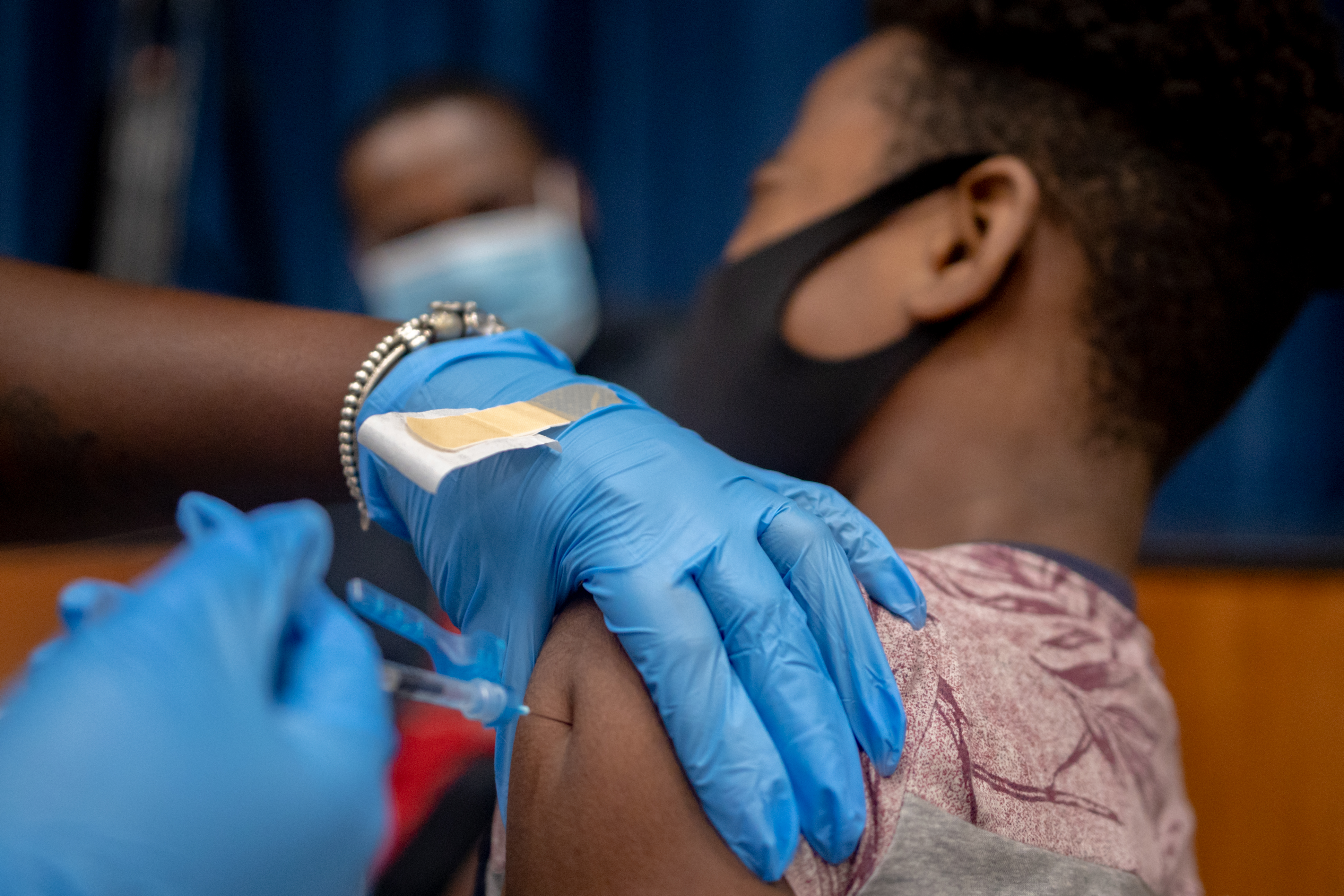
The US Food and Drug Administration on Monday expanded the emergency use authorization for the Pfizer/BioNTech Covid-19 vaccine boosters for children ages 12 to 15.
The agency also shortened the time needed between an initial series of vaccine and a booster from at least six months after completion of an initial series to at least five months for everyone 12 and older.
Pfizer’s booster dose contains the same amount of the vaccine as the initial doses: 30 micrograms.
Adolescents in this age group became eligible to receive their initial series of the Pfizer/BioNTech Covid-19 vaccine in mid-May, opening vaccinations up to about 17 million additional people.
Now, about half of the populations aged 12 to 15 – about 8.7 million – is fully vaccinated, according to data from the US Centers for Disease Control and Prevention. About 5 million of them have been fully vaccinated for more than five months and are now eligible to receive a booster shot.
Children in this age group represent about 5% of the total US population. They account for about 4% of the fully vaccinated population in the US and about 3% of those eligible to receive a booster shot, according to the latest CDC data.
In October, the CDC recommended that everyone age 16 and up who completed their initial series of the Pfizer/BioNTech or Moderna vaccine at least six months ago receive a booster shot, along with those who received their initial Johnson & Johnson shot at least two months ago.
The FDA also authorized a third dose as part of the primary series for certain immunocompromised children ages 5 to 11, including those who have received an organ transplant.
Overall, about 68.8 million people are fully vaccinated and boosted against Covid-19. That’s less than half of the nearly 180 million people who are eligible to receive their booster shot and about a fifth of the total US population. And at least 69 million people ages 5 and up have not received their first dose of Covid-19 vaccine, according to the latest CDC data.
Is it a cold, the flu or Covid-19?
From CNN's Madeline Holcombe
Do you have a sore throat, a runny nose and muscle aches? It could be a common cold, a case of the flu – or Covid-19.
The illnesses all share similar symptoms, sometimes making it hard to distinguish which is putting you under the weather.
Case rates of Covid-19 have been on the rise as the Omicron variant has spread, but hospitalization numbers appear to be staying relatively low. For vaccinated people, evidence suggests that infection with this variant seems less likely to be severe, epidemiologist and former Detroit Health Department executive director, Dr. Abdul El-Sayed said.
"The important thing to remember is a vaccine is like giving a 'be on the lookout' call to your immune system. So its capacity to identify, target and destroy viruses is so much higher every time we take another boost of the vaccine," El-Sayed said. "It makes sense that the symptoms you would experience are milder if you have been vaccinated."
That does not mean, however, that infections shouldn't be taken seriously, he added, especially when considering the risk of overwhelming health care systems.
"Just because the per-individual risk of severe illness may be lower, that doesn't mean on a societal level Omicron doesn't pose a real risk," he said. "Even a small proportion of a relatively large number can be a relatively large number."
Many Covid-19 infections may look like a cold or flu. The best way to know is to get a test, said Dr. Sarah Ash Combs, attending physician at Children's National Hospital.
"Short of getting a test, I would say it's really tricky to distinguish right now," Combs said. "We need to just treat cold-ish symptoms in pretty much the same bucket" as Covid-19.
What symptoms to look for:
Early signs of cold, flu and Covid-19 tend to be similar, El-Sayed said.
Both Covid-19 and the flu often cause symptoms such as fever, fatigue, body aches, sore throat, shortness of breath and vomiting or diarrhea, according to the US Centers for Disease Control and Prevention.
Covid-19 infection can be distinguished, however, by the headache and dry cough that often go along with it. The loss of taste and smell that has been the biggest warning sign of a Covid-19 infection is still a possible symptom, though it is less prevalent now than it has been with other variants, El-Sayed said.
"For people who are feeling serious chest pain, particularly with a dry cough that has gotten worse, that's when you really ought to seek medical attention," he warned.
The most important factor to consider is exposure.
"If you are starting to feel any of these symptoms, it's worth asking: Has anybody with whom I've come into contact been infected with Covid? It's also worth isolating and taking a rapid test," he advised.
Even if you're not feeling symptoms yet, it may be best to exercise caution if you have been around someone who tested positive for Covid-19.
"I do think it is worth keeping a high suspicion that it could be Covid considering that we have the Omicron variant spreading like wildfire," El-Sayed added.
At this point, it is safest to treat all cold symptoms carefully, Combs said.
When to test for Covid-19:
It is often good to address your suspicions of Covid-19 by taking a test, although when you do it makes a difference.
If you are feeling symptoms, now is the time to take a test, El-Sayed said.
For those who have been exposed but aren't feeling symptoms, there is a possibility that the virus hasn't developed enough to show up on a rapid test, he explained. In those cases, it is best to wait five days after exposure before testing and to remain on the lookout, according to the CDC.
"Just because you get a negative test doesn't necessarily mean it's not Covid," El-Sayed said. "The best approach is to test and then maybe test again in 12 to 24 hours, and if you get two negatives, you can be more certain that it's not."
Whether it is Covid-19 or the common cold, it has always been a good idea to isolate while you fight a viral illness, he said. It has become even more important with the risk of spread increasing with Covid-19.
New York City Mayor Eric Adams on schools: "We're staying open"
From CNN's Kristina Sgueglia
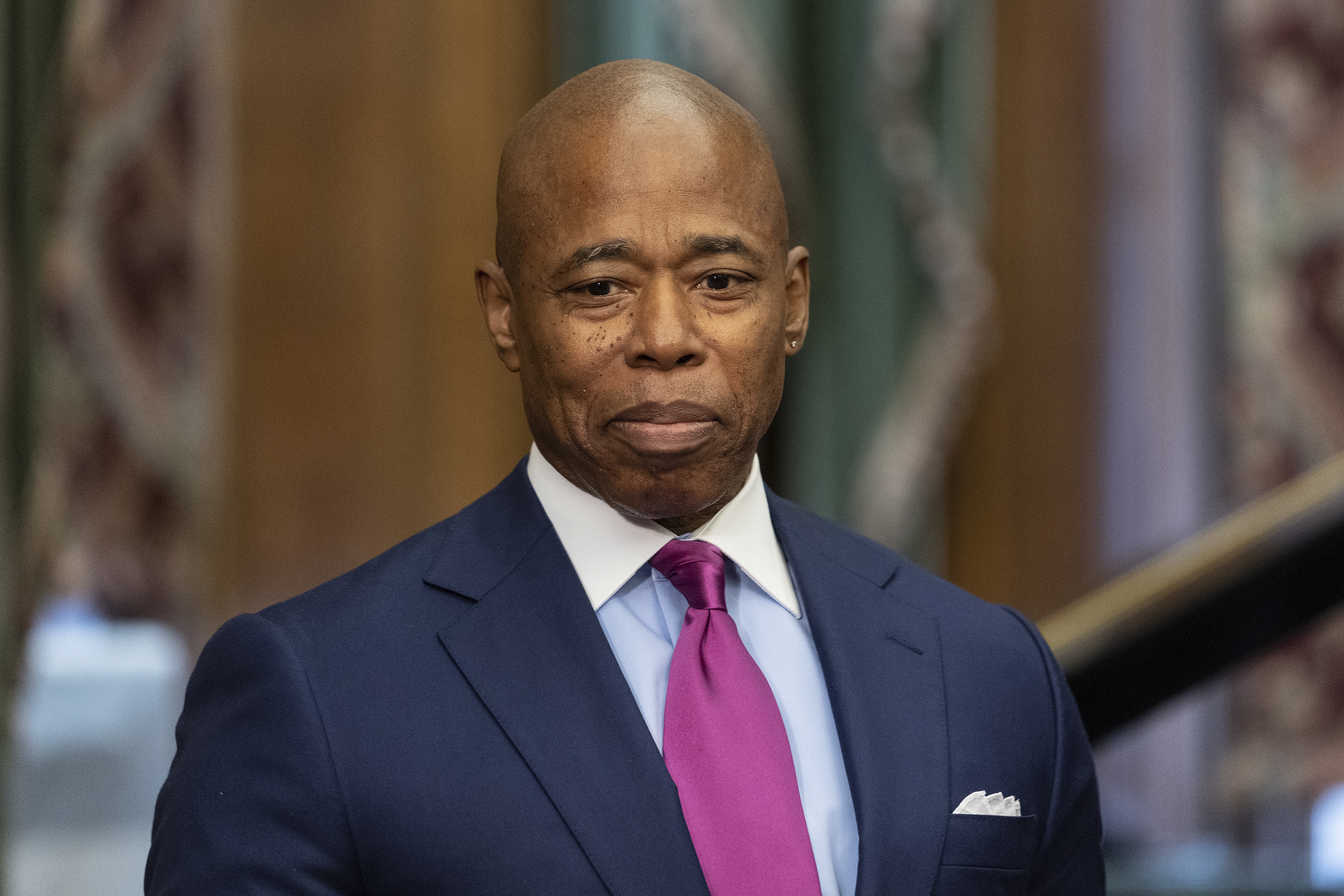
New York City Mayor Eric Adams delivered a clear message Monday morning that even amid an Omicron surge, when it pertains to schools, “we’re staying open.”
“We’re not sending an unclear message of what is going to happen day-to-day. I’m going to tell you what’s going to happen day-to-day, we’re staying open,” Adams said.
City officials touted the success of 1.5 million test kits delivered across the NYC Department of Education system over the weekend and announced a Covid command center to help educators escalate concerns, such as staffing, as students returned to school for the first day of the new year.
Adams and School chancellor David C. Banks, among others, gathered to welcome students back to school on the first day back in the new year at Concourse Village Elementary school in the Bronx.
“We’re really excited about the opening of our schools and we want to be extremely clear, the safest place for our children is in a school building and we are going to keep our schools open and ensure that our children are safe in a safe environment,” Adams said. He reminded people that the transmission rate was less than 1% inside a school last year.
“Schools play a role of safety and stability for our children,” he said.
Adams emphasized the city “took over 1.5 million test kits,” and mobilized educators and placed test kits in every school in the DOE.
“Seamless coordination of how city agencies are supposed to come together to do what I say all the time, and what my administration is going to be known for, “GSD,” Get Stuff Done.”
Adams acknowledged there remain questions about testing and staffing saying “there’s a lot of questions, but we’re going to turn those question marks into an exclamation point, we’re staying open.”
Chancellor Banks said officials are monitoring all staffing issues, have shored up a sub-pool and a fully developed pool of paraprofessionals, and that all central staff is “ready to go.”
When asked about staffing he said, “all indications are that we’re in a pretty good place right now, we’ll be prepared to make whatever adjustments are needed.”
UK prime minister warns of considerable pressure on hospitals as Covid-19 cases surge
From CNN's Amy Cassidy
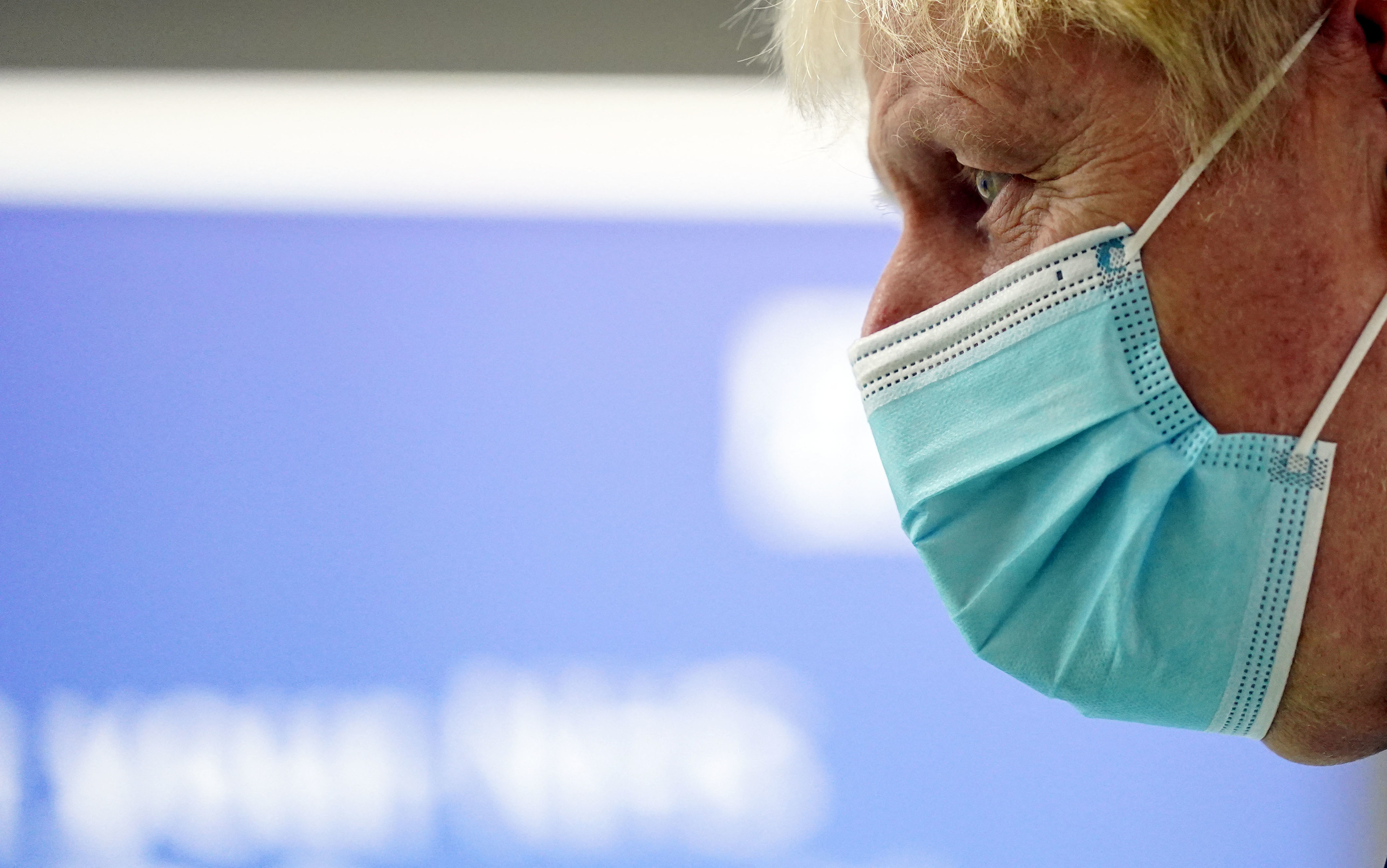
UK Prime Minister Boris Johnson warned the pressure on hospitals “is going to be considerable in the course of the next couple of weeks, and maybe more,” as Omicron cases surge.
The majority of people in the intensive care unit have not been vaccinated and “about 90%” have not received a booster dose, he told reporters on Monday, urging citizens to “get boosted”.
Despite all this, Johnson has resisted following the other UK nations in imposing restrictions on large gatherings to curb the spread.
“I think the way forward for the country as a whole is to continue with the path that we're on,” he said.
“We'll keep everything under review, of course we keep all measures under review. But the mixture of things that we're doing at the moment is, I think, the right one.”
Johnson asked people to take England's current measures “seriously,” which include working from home where possible, wearing a mask on public transport and taking a lateral flow test before meeting up with others.
From Monday, students in secondary schools and above are advised to wear masks.
Johnson also cast doubt over reducing the self-isolation period from seven days to five, in line with new US guidelines.
“We’ll continue to look at the infectivity periods, but the key thing is, we don’t want to be releasing people back into the workplace when they’re still infectious,” he said.
“The risk is you increase the numbers of people going back into the workplace who are infectious by a factor of three, so you might perversely have a negative effect on the workforce. That’s the argument we’re looking at,” he said.


![[Pics] Struggles Tall Women Have [Pics] Struggles Tall Women Have](https://images.outbrainimg.com/transform/v3/eyJpdSI6IjIzYTI3YjYyY2NiNmE4MTQ3ZTIwNzA2MWU5ODk0MzJiOTE4ZmJjMmZiYjk2ZDhhZmYyOTJkMDcxMDQyYWExNWEiLCJ3IjoyMjUsImgiOjEzNiwiZCI6MS41LCJjcyI6MCwiZiI6MH0.jpg)


![[Pics] Hilarious Windshield Notes That Are Actually Real [Pics] Hilarious Windshield Notes That Are Actually Real](https://images.outbrainimg.com/transform/v3/eyJpdSI6Ijc4MGY3ZDdjMmVjZDA3MWM3ZWIzNmFhOWQ2MGVhMmNlNjRiYTQ5NDEzOWQwNzk4YzExYjliYzlhMTJkNmQxMjMiLCJ3IjoyMjUsImgiOjEzNiwiZCI6MS41LCJjcyI6MCwiZiI6MH0.jpg)
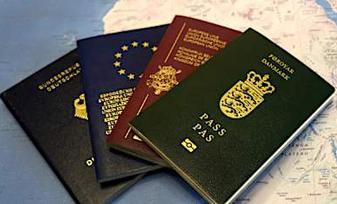
![[Pics] Provocative Pics Of New Teacher At School Go Viral [Pics] Provocative Pics Of New Teacher At School Go Viral](https://images.outbrainimg.com/transform/v3/eyJpdSI6IjMxNmYzMmU3ZjI4ZjUwNWZlMzMwZjkwNTg4MjVjYTQ1N2I4NWNlYTFiMGU1YjMzZGRjMzMxZWViN2JkZGMyZjciLCJ3IjoyMjUsImgiOjEzNiwiZCI6MS41LCJjcyI6MCwiZiI6MH0.jpg)